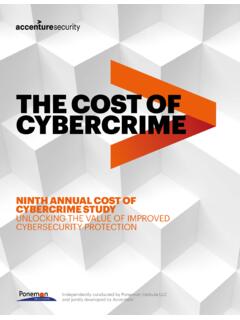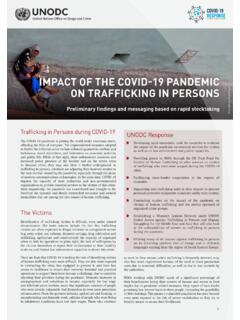Transcription of THE COST OF CYBER CRIME. - GOV.UK
1 A DETICA REPORT IN PARTNERSHIP WITH THE OFFICE OF CYBER SECURITY AND INFORMATION ASSURANCE IN THE CABINET OFFICE. THE cost OF CYBER Insight Executive summary 1 Chapter 1: Introduction 4 Why estimate the cost of CYBER crime ? 4 Chapter 2: What is CYBER crime ? 6 What types of CYBER crime have we considered? 6 Who are the CYBER criminals? 8 What do CYBER criminals target? 9 What is the impact of CYBER crime ? 11 Chapter 3: Study methodology 14 Constraints and assumptions 14 Sources of data on IP theft 14 Our methodology for assessing the impact of IP theft 15 Our methodology for assessing the impact of industrial espionage 16 Chapter 4: Results and analysis 18 cost to citizens 18 cost to the Government 19 cost to businesses 19 Other findings 22 Chapter 5: Conclusions and recommendations 24 The cost of CYBER crime is significant and growing 24 The impact of CYBER crime is felt most by UK business 24 The UK needs to build a comprehensive picture of CYBER crime 24 Annex A: Organisations consulted 25 Annex B: business sector background 25 About Detica BCThe cost of CYBER Crime1 WHY ESTIMATE THE cost OF CYBER crime ?
2 Our society has become almost entirely dependent on the continued availability, accuracy and confidentiality of its Information and Communications Technology (ICT). As well as significant benefits, the technology has enabled old crimes to be committed in new and more subtle ways. In its National Security Strategy, CYBER threats are recognised by the Government as one of four Tier One risks to the UK s estimates of the cost of CYBER crime have until now failed to address the breadth of the problem and have not been able to provide a justifiable estimate of economic impact . Therefore, the Office of CYBER Security and Information Assurance (OCSIA) worked in partnership with Detica to look more closely at the cost of CYBER crime in the UK and, in particular, to gain a better appreciation of the costs to the UK economy of Intellectual Property (IP) theft and industrial espionage.
3 Further developments of CYBER crime policy, strategies and detailed plans thus benefit from greater IS CYBER crime ?For the purposes of this study, we are using the term CYBER crime to mean the illegal activities undertaken by criminals for financial gain. Such activities exploit vulnerabilities in the use of the internet and other electronic systems to illicitly access or attack information and services used by citizens, business and the Government. We have not included crimes that lack an over-riding financial motive, or attacks of CYBER terrorism or CYBER warfare . In our study, we have focused on: identity theft and online scams affecting UK citizens; IP theft, espionage and extortion targeted at UK businesses; and fiscal fraud committed against the recognise that the full economic impact of CYBER crime goes beyond the direct costs we have been able to estimate in our study, but given the lack of available data and what we believe to be a significant under-reporting of CYBER crime , we have had to be pragmatic in our SUMMARY2 DeticaSTUDY METHODOLOGYTo address the complexity of less understood CYBER crime , which is the focus of this study, we develop a causal model, relating different CYBER crime types to their impact on the UK economy.
4 The model provides a simple framework to assess each type of CYBER crime for its various impacts on citizens, businesses and the Government. We use the causal model to map CYBER crime types to a number of broad categories of economic impact , which are generally consistent with the types of parameters used in macro-economic models of the UK. We then calculate the magnitude of the costs of CYBER crime using three-point estimates (worst-case, most-likely case and best-case scenarios), focusing in particular on IP theft and industrial espionage and its effect on the different industry sectors. Our assessments are, necessarily, based on estimates and assumptions rather than specific examples of CYBER crime , or from data of a classified or commercially-sensitive origin. We have drawn instead on information in the public domain, supplemented by the tremendous knowledge of numerous CYBER security, business , law enforcement and economics experts from a range of public and private-sector organisations.
5 We are indebted to all those individuals and organisations who contributed their time and expertise to this study. RESULTS AND ANALYSISIn our most-likely scenario, we estimate the cost of CYBER crime to the UK to be 27bn per annum. A significant proportion of this cost comes from the theft of IP from UK businesses, which we estimate at per annum. In all probability, and in line with our worst-case scenarios, the real impact of CYBER crime is likely to be much greater. Although our study shows that CYBER crime has a considerable impact on citizens and the Government, the main loser at a total estimated cost of 21bn is UK business , which suffers from high levels of intellectual property theft and espionage. Businesses bearing the brunt of CYBER crime are providers of software and computer services, financial services, the pharmaceutical and biotech industry, and electronic and electrical equipment & defenseAutomobiles & partsChemicalsAll types of CYBER crimeOnlineFraudScarewareIdentitytheftIP theftEspionageCustomerdata loss(reported)Online theftfrom businessExtortionFiscal fraud 10,000M 9,000M 8,000M 7,000M 6,000M 5,000M 4,000M 3,000M 2,000M 1,000M 0 MCost of different types of CYBER crime to the UK economyThe cost of CYBER Crime3 CONCLUSIONS AND RECOMMENDATIONSC yber crime is a national scale issue.
6 The cost to the economy, estimated at 27bn, is significant and likely to be growing. The ease of access to and relative anonymity provided by ICT lowers the risk of being caught while making crimes straightforward to conduct. The impact of CYBER crime does not fall equally across industry sectors. The results also challenge the conventional wisdom that CYBER crime is solely a matter of concern for the Government and the Critical National Infrastructure (CNI), indicating that much larger swathes of industry are at risk. The results of this study suggest that businesses need to look again at their defences to determine whether their information is indeed well protected. Without urgent measures to prevent the haemorrhaging of valuable intellectual property, we believe that the cost of CYBER crime is likely to rise even further in the future as UK businesses increase their reliance on ICT.
7 However, encouraging companies in all sectors to make investments in improved CYBER security, based on improved risk assessments, is likely to considerably reduce the economic impact of CYBER crime on the UK. Although the existence of CYBER crime in the UK economy appears endemic, efforts to tackle it seem to be more tactical than strategic. The problem is compounded by the lack of a clear reporting mechanism and the perception that, even if crimes were reported, little can be done. Additional efforts by the Government and businesses to build awareness, share insights and measure CYBER crime would allow responses to be targeted more effectively. 27BN: ESTIMATED cost OF CYBER crime IN THE & defenseFixed line telecommunicationsConstruction & materialsGas, electric, water & multiutilitiesAutomobiles & partsFood & drug retailersElectronic & electrical equipmentGeneral retailersChemicalsFood and beverage producersFinancial servicesPharmaceuticals and biotechIndustrial engineeringIndustrial metals & miningIndustrial transportationLife and non life insuranceMediaMiningMobile telecommunicationsOil & gas producers (inc equip, serv & dist)
8 Not for profitsReal estate investments, trusts & servicesSupport servicesSoftware & computer servicesTechnology hardware & equipmentTravel & leisure 3,000M 2,500M 2,000M 1,500M 1,000M 500M 0 MEspionage IP theft Online theft from businessCost of different types of CYBER crime to UK industry sectors4 DeticaCHAPTER 1 INTRODUCTION Footnote1 Email and internet statistics from the Pingdom Blog, January 2011 ( ) 2 Mobile statistics from Wireless Intelligence, July 2010 ( ) and ( ), 20103 CYBER Security A new national programme , Emma Downing, House of Commons Library Standard Note SN/SC/5832, 19 January 20114 For example, see Industrial espionage: Data out of the door published in the Financial Times, 1 February 20115 A strong Britain in an age of uncertainty , National Security Strategy, October 20106 Unsecured Economies: Protecting Vital Information , McAfee, 2009 WHY ESTIMATE THE cost OF CYBER crime ?
9 Few areas of our lives remain untouched by the digital revolution. Across the world, there are now nearly two billion internet users and over five billion mobile phone connections; every day, we send 294 billion emails and five billion SMS messages; every minute, we post 35 hours of video to YouTube, 3,000 photos to Flickr and nearly 35,000 tweets 1,2. Over 91 per cent of UK businesses and 73 per cent of UK households have internet access and billion was spent online in the UK alone in 20093. Our society is now almost entirely dependent on the continued availability, accuracy and confidentiality of its Information and Communications Technology (ICT). We need it for our economic health, for the domestic machinery of government, for national defence and for our day-to-day social and cultural the technology s obvious benefits, the seeds of criminality planted by the first computer hackers 20 years ago have allowed old crimes to be committed in new and more subtle ways.
10 The information generated by the technology is also a target of considerable interest for individuals, groups, organisations and nation states with more malign intent. And the level of concern expressed by some commentators suggests that CYBER crime is a problem of considerable magnitude4. In its National Security Strategy5, for instance, the UK Government recognised CYBER threats as one of four Tier One risks to the UK s security, and subsequently announced a 650m investment in a National CYBER Security , although the fears seem to be well founded, estimates of the impact of CYBER crime have until now been no more than best guesses . For example, there is no mandatory reporting regime for citizens, companies or public-sector organisations, which forces them to declare having being the victim of CYBER crime and what it has cost them.















